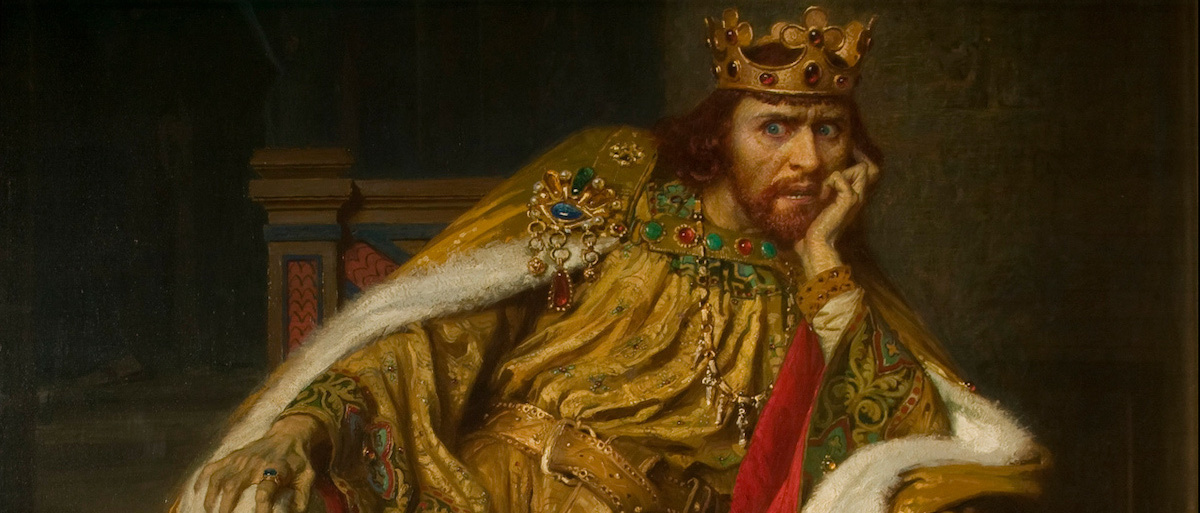King John Lackland: The Idiot Son
Posted on 24th April 2021
He was a scion of the powerful Angevin Dynasty, the son of King Henry II and his formidable wife Eleanor of Aquitaine yet despite the impressive lineage was to become arguably the worst ever King of England. He was to all intents and purposes the Idiot Son.
In popular folklore King John is best remembered as the man who was thwarted in his ambitions by Robin Hood and his Band of Merry Men. But he was always more serious than that, a cunning, cruel, capricious, untrustworthy and paranoid man whose failings as a human being were made all the worse by the corrupting influence of power.
John was born on 24 December 1166, the fifth son of Henry and Eleanor and neither as tall nor physically imposing as his brothers was very much the runt of the litter. He spoke with a lisp and lacked both their dash and athletic prowess. Yet despite often behaving like a peevish and petulant child his father seems to have taken pity on him and made him his favourite. This may have been the result of him being less threatening than his brothers Henry, Geoffrey, and Richard.
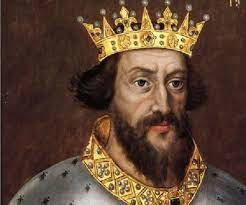
Henry II was the grandson of William the Conqueror and by all accounts a bundle of nervous energy. Of average height, stocky and very strong he seemed always to be in the saddle and rarely remained in the same place for long. Indeed, so relentless was he in his hunting and whoring that he often left his courtiers trailing in his wake. In appearance he had a ruddy complexion, a mane of red hair and piercing grey eyes. He was also possessed of a temper so fierce it was said it could make men physically tremble.
An able administrator, wily diplomat and formidable military commander he hated to delegate power and only did so to satisfy the demands of his ambitious children and then in a way that would end in him enhancing his own. He believed he needed to keep them in check and would so by playing one off against the other. But he would in time reap what he had sown as like father like son he would be in constant conflict with his children encouraged as they were to rebel against their father by his duplicitous wife, Eleanor of Aquitaine.
Eleanor was eleven years Henry’s senior and at the time of their marriage was already a woman of the world compared to her naive and enthusiastic young husband for she had previously been married to King Louis VII of France who she had accompanied on the Second Crusade.
The Crusade itself was a miserable failure for which Eleanor was held largely to blame; perceived to be domineering, meddlesome, arrogant and haughty she refused to remain silent in the presence of the King even chastising him in public and would arbitrarily dismiss those of his advisors who she disapproved of. She’d also had a very had a very public affair that did irreparable damage to her marriage. Indeed, for a time she and Louis were barely on speaking terms, and they returned to Europe on separate ships.
Yet despite all this there was barely anyone who encountered Eleanor who failed to be impressed by this intelligent, strong-willed and independent woman but this didn’t prevent the French Court from breathing a huge sigh of relief when she and Louis divorced on 11 March 1152 on the grounds of consanguinity. The real reason was that she had failed to provide the King with a son and heir but later claimed that being with Louis was like living with a monk and that her failure to bear dynastic fruit had nothing to do with her.

Eleanor was not to remain single for very long and on 18 May 1152 she wed Henry. It was first and foremost a political marriage of course but much to everyone’s surprise they took a fancy to one another. He could not help but be impressed by this worldly woman and she by the self-confident athleticism of this man who knew what was required between the sheets and she was to prove her fecundity by providing Henry with 8 children, including 5 sons despite by now being in her early thirties which at the time was considered middle-aged.
As we have seen, Eleanor was not a compliant woman. She was aware of her status as the Duchess of Aquitaine one of the richest territories in Europe. She acted from a position of strength, expected to get her way and was willing to conspire with others to doso. She was trouble and Henry had been warned by his own father to have nothing to do with her. Needless to say, he ignored his advice.
Described as being the embodiment of grace and charm Eleanor was tall, fair and small bosomed with deep blue eyes who on occasions liked to disguise herself as a man something it was said she carried off with great aplomb.
Henry was to fall utterly for her charms and together they were to form a formidable partnership. These were the parents then that the young John had to contend with along with his more physically impressive and ambitious brothers who continued to treat him as if he were a child well into adulthood. Indeed, his inability to control a violent temper that would see him and his tendency to dribble when excited did nothing to dispel the feeling among the family that he was an idiot – was there no one who took him seriously.
Nonetheless, in the delicate negotiations that were an on-going feature of Henry’s reign he strained to balance the interests of all his children. He wished to satisfy all their ambitions and to ensure that none were neglected or left out.
In June 1170 to bring some order to his increasingly fractious family Henry took the unusual step of crowning his eldest son, also Henry, King of England while he himself still reigned. He hoped that by doing so it would guarantee an orderly succession and that his younger brothers would then pay homage to Henry and be prepared to take subordinate roles.
He was trying to prevent the sibling rivalry he feared would fracture the dynasty upon his death, but his plan foundered on his refusal to delegate any real power to his son and in 1173, the younger Henry, frustrated with little more than a ceremonial role conspired with his brothers Geoffrey and Richard in a rebellion against their father. The rebellion was easily crushed, and Henry treated his children leniently. However, when he discovered that Eleanor had been the organising genius behind the rebellion, he had her imprisoned and she was to remain incarcerated for the next fifteen years only being released at Christmas and for family occasions. This was not a new experience for Eleanor, for she had also been imprisoned by her previous husband, Louis.
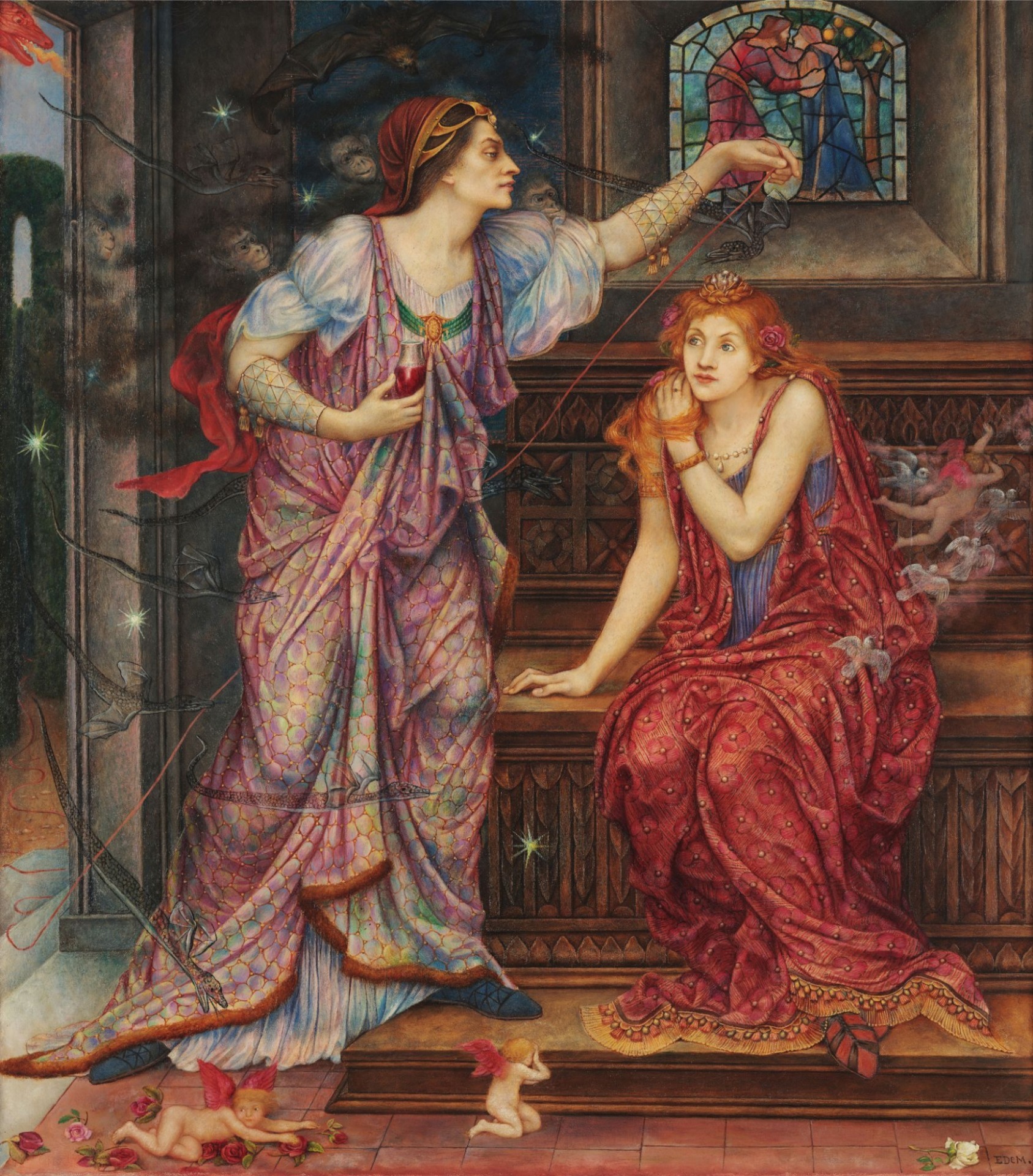
The truth is that Henry had long ago fallen out of love with his wife, glamorous and admired though she was and in 1166 he had taken a lover, the buxom, more compliant and less challenging Rosamunde Clifford. She rarely interfered in dynastic or family affairs and was always available to satisfy his needs. She was also half Eleanor’s age. Henry doted on her. When she died in 1176, it was said that he wept copiously and was for a time in a state of some distress. Many believed, including Henry himself that Eleanor had had poisoned her. If so, it did her little good.
When Henry’s children weren’t conspiring against their father, they were squabbling amongst themselves with John hanging onto the coat tails of whichever brother would have him.
In 1183, the younger Henry died of dysentery destroying at a stroke Henry’s dynastic masterplan. His death, Henry knew, provided an opportunity for his other sons and he was desperate to head off any further rebellions. He tried to placate them by dividing and parcelling out lands and titles between them and in 1185, John was made Overlord of Ireland, but his rule was so unpopular that Henry was forced to recall him after only eight months. Even so he continued to lavish land and titles on his favourite.
Geoffrey, who was now Henry’s eldest surviving son and therefore his designated successor, was a famous champion of the jousts. Henry cautioned him that now given his newly elevated status it would be wise to cease a pursuit he thought to be foolish and thick-headed in any case. Geoffrey chose to disregard his father’s advice, and in the summer of 1186, he died from wounds sustained when falling from his horse in just such a tournament.
Richard was now the undisputed heir to the Angevin dynasty and if John had been his father’s favourite, then Richard was very much the apple of his mother’s eye. He had long been groomed as her preferred weapon of choice in her on-going campaign of vengeance against her husband. She put it to him that because of his close relationship with her his father might overlook him for the succession in favour of John. He found this difficult to believe but encouraged by his mother he formed an alliance with Henry’s arch-enemy King Philip Augustus of France who was also at the time his lover, and attacked his father’s possessions in Anjou.
Yet again, Henry was made to wage war on his own son. This time however the rebellion was not crushed and defeated in battle Henry was forced to yield to their demands. In doing so he vowed vengeance upon Richard and told him so in no uncertain terms, but it wasn’t to be. He was seriously ill and as he lay dying, he asked to know the names of those who had conspired against him and when John’s name was read out it was said his heart broke.
The only one of his children present at his deathbed was an illegitimate son, Geoffrey. He told him, “My legitimate sons, they are the real bastards.”
Richard did not mourn for long and had himself crowned King Richard I of England and Anjou, and Duke of Normandy just hours after his father’s death.
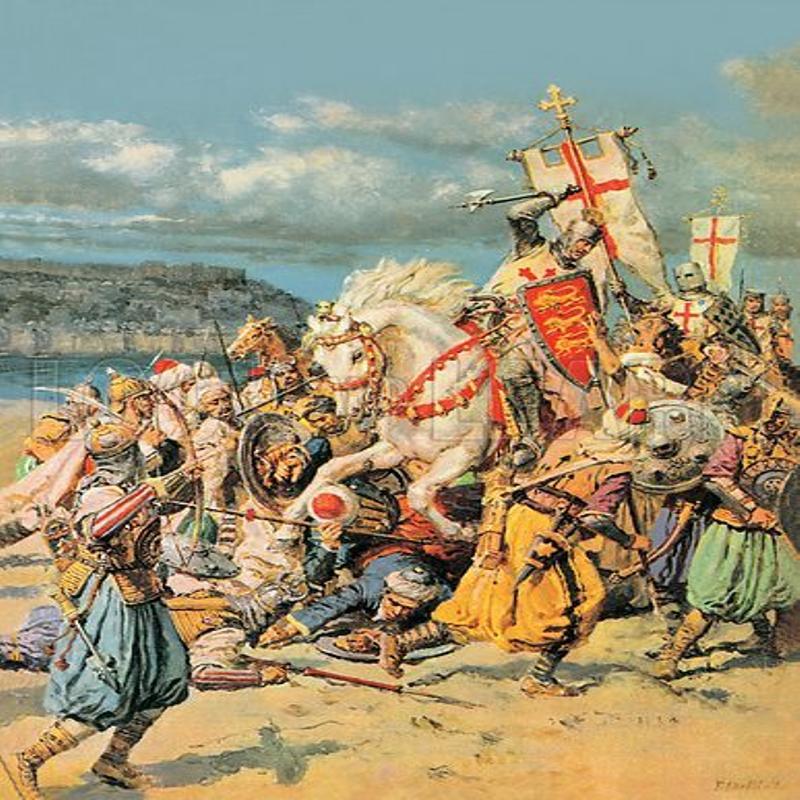
Known as ‘Lion Heart’, Richard was the epitome of the Warrior King tall, powerful with a mane of long blonde, red hair and cold grey eyes. He was dashing, brave, headstrong and ruthless. In fact, he was everything his little brother John was not. He was also bisexual, and it was said of his relationship with Philip Augustus that “they ate from the same dish, and slept in the one bed.” He was later to do penance for the act of sodomy.
In his entire ten-year reign, he only spent six months in England and though he had been born and raised in the country he never learned its language, was contemptuous of its people and was to bitterly complain of the cold and constant rain.
In 1187, he had taken the Cross and vowed to liberate Jerusalem and return the Holy Land to Christendom and three years later embarked upon the Third Crusade in tandem with Philip Augustus determined to make good on his vow.
The ensuing events would cement his place as a legendary hero, but he was neither to liberate Jerusalem (which being unable to capture he refused to set eyes upon) or conquer the Holy Land which remained firmly under the control of his great rival Saladin. More significantly perhaps he was absent from his Kingdom for four years which provided John, who was disgruntled at having been effectively side-lined the opportunity to move against him.
Any qualms John may have harboured regarding his treachery ceased when he discovered that Richard had made provision in his Will for his young nephew Arthur of Brittany to succeed him upon his death; so in alliance with the recently returned Philip Augustus who had since fallen out with Richard and feigned illness to escape the rigours of the Crusade he made his move.
Travelling to England from Normandy he easily deposed William Longchamp who had been made Regent in Richard’s absence and took on the mantle of heir presumptive confident that he would never see his brother again for in December 1192 on his return journey from the Holy Land Richard had been captured and taken hostage by his old enemy Duke Leopold V of Austria who he had humiliated while on Crusade.
Leopold held onto Richard for a few months enjoying having him under his sway before he sold him onto Charles V, the Holy Roman Emperor, who then demanded 150,000 marks for his release. Seemingly unconcerned by his predicament Richard refused to be cowed or to pay homage to the Emperor telling him: “I am born of a rank that knows no superior other than God.”
Richard had inherited many of his mother’s character traits in particular her haughty demeanour but also her courage and charm. Despite his arrogance however, the Emperor took a liking to him and he was well treated.
Eleanor who Richard had immediately released from her captivity upon Henry’s death worked tirelessly to secure her son’s release. She raised taxes, sold Church property and even pawned the Crown Jewels. In the meantime, John did nothing. Indeed, he and Philip Augustus wrote to the Emperor offering him 80,000 marks to keep Richard in captivity.
Despite John’s best endeavours to thwart his mother’s fund-raising activities she managed to acquire the ransom money even if this had meant effectively bankrupting England in the process, and Richard was duly released. In early 1194, John received a letter from Philip Augustus, it read: “Beware the Devil is loose. Look to yourself.”
John immediately went into a paroxysm of fear and upon Richard’s return to England discarded any pretence at Kingship and prostrated himself at his brother’s feet begging forgiveness for any wrongdoing he may have committed. Richard pulled him up off the ground and told him: “I forgive you, John. You are just a child.” He was actually twenty eight at the time but despite his treachery and the fact that Richard obviously had little respect for him he reinstated John to the line of succession.
No doubt political necessity played a part in his decision but it is also likely Eleanor persuaded him to do so.
In the early evening of 25 March 1199 Richard was inspecting the fortifications surrounding a castle he was besieging near Limoges. He had been advised to don chain mail but had refused not wanting to display fear to the enemy. Not long after he was struck in the shoulder by a bolt fired from the crossbow of a soldier posted on the castle ramparts. It had buried itself deep into his flesh and in the botched attempt to remove it the wound had become infected and turned gangrenous. Taken to his bed he died soon after.
At last, John would be King but his reign paranoid and peevish would be as miserable as his life. He trusted no one and received no loyalty in return.
In 1203, to impose his authority and subdue those who still advocated the claim of his nephew the teenage Arthur of Brittany he waged war in northern France. This he did with only limited success, but he did manage to capture Arthur who was by now being supported by Eleanor. Despite his youth Arthur refused to yield to John in any way and told him so to his face. There was something in John’s character that even as King made him incapable of cowering even a fifteen-year-old /child. Sometime in April 1203, John decided to deal with the problem of the young Arthur personally. A chronicler tells us how: “John had captured Arthur and imprisoned him in the Castle at Rouen. After dinner on the Thursday before Easter, when he was drunk and possessed by the Devil, he slew him with his own hand, and tying a heavy stone to the body cast it into the Seine.”
John’s brutal murder of the young Arthur only served to damage his reputation even further. Not that he seemed to care very much. His war in France had not been a great success but he believed it had. As far as he was concerned, he had triumphed. With newfound confidence in his ability as a military commander he now refused to pay homage to his titular overlord Philip II of France and another war soon ensued. This however was nothing less than a disaster as he lost the provinces of Anjou, Maine and most of Poitou.
He was certainly no Richard yet he remained determined to restore his prestige and renounce his nickname ‘Soft Sword.’ But all he achieved was to lose even more of the family’s ancestral lands in France while the taxes required to pay for his failures were raised to punitive levels.
In 1207, he quarrelled with the Pope over his choice of Archbishop of Canterbury which had to be approved by the Vatican. John refused to compromise and as a result the Pope excommunicated him personally and placed England under Papal interdiction. No longer could people marry in Church, christenings could not be performed, absolution not received, and the dead had to be buried in un-consecrated ground. England had become a country forsaken by God and his subject’s immortal souls, high and low, had been imperilled and threatened with eternal damnation.
Rather than negotiate or seek a compromise, John instead took it upon himself to seize Church property and embarked upon a land grab filling his coffers with illicit treasure that he would later be forced to return. His prestige for what it was worth diminished even further and his authority began to ebb away.
His argument with the Church was one he would lose and when in 1213, with the country in financial ruin and close to chaos the Pope Innocent II authorised King Philippe Augustus of France to wage Holy War and depose him, John submitted and paid fealty to the Pope effectively handing England over to Papal control. It was only as a vassal of the Pope could he hope to remain King.
Not long after this humiliation John again went on campaign in France desperate for a military triumph but his military incompetence led to a crushing defeat at the Battle of Bouvines and the loss of his remaining French territories. For many of his Barons it was the final straw. Weary of the ever-increasing burden of taxation, the lack of respect for their rank, the trampling of their feudal rights and the expropriation of their property they at last rebelled.
In January 1215, a delegation of Barons led by Earl Fitzwalter and Llewellyn of Wales armed and with troops entered London and took control of the city determined to confront the King. John had little choice but to meet with them but in ill-temper he dismissed the Charter of Rights they presented him with demanding that they respect his status as a King divinely appointed by God. The Barons departed disgruntled to their Estates where they prepared for war.
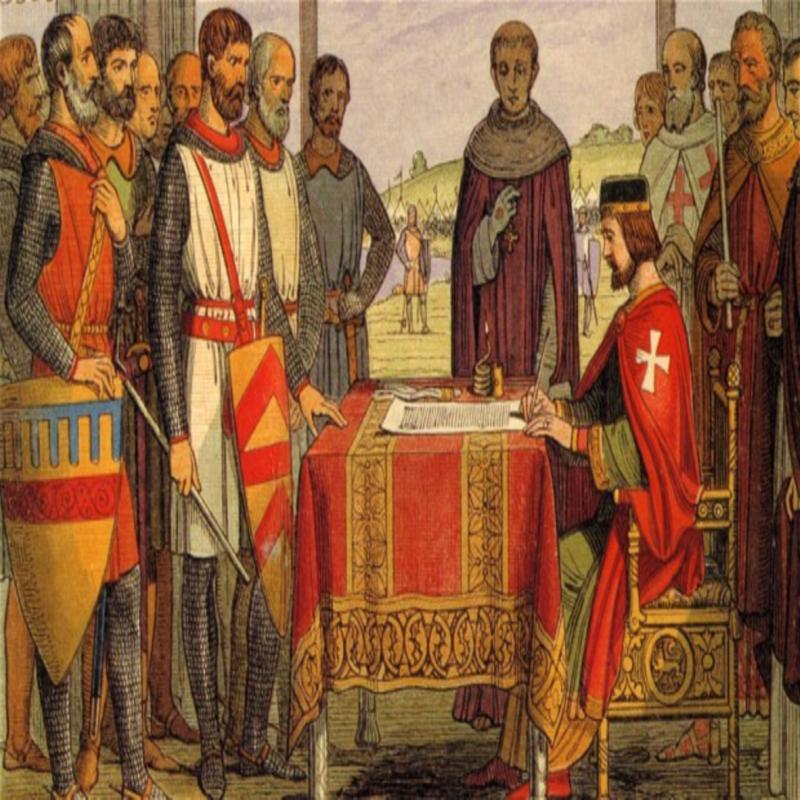
John realised that he was in no position to confront the Barons and so on 15 July 1215 when the two armies met beside the River Thames at Runnymede, he showed a willingness to negotiate and four days later gave his official seal to what would become known as Magna Carta or the Great Charter, ceding much of his power to the Barons.
Magna Carta has often been misunderstood. It was not a Charter for democratic freedoms a concept that would have been alien to the medieval mind but rather an expression in law of Baronial rights, yet with its opposition to absolute power and emphasis on due process of law it has a legacy for us that goes beyond perhaps what its framers had intended at the time.
For John however its significance lay in Clause 61 which for the first-time placed restraints on a King’s right to rule. It declared that in future a Committee of 25 Barons would be summoned should the King once informed that he had done so continue to behave without reference to the Charter or infringe upon those rights enshrined within it. These Barons would be freed of their oath of loyalty and could overrule the King on any issue and do so by force if required.
No sooner had John sealed the Charter and the Barons departed Runnymede than he reneged upon and disavowed it. As he had been forced to concede to the Charter under duress, he was within his rights to do so and he also had the support of the Pope who forbade him to negotiate any deals without consulting him first.
His arrogance in so swiftly rejecting the Charter he had only just agreed to was to spark the First Barons War. Indeed, so heartily sick of John were the Barons that they offered the throne of England to their mortal enemy King Philip’s son, Louis.
On 22 May 1216, Louis landed with a 7,000 strong army to claim his Crown. Made aware of the fact John abandoned London in great haste and fled north. During his flight he lost the Crown Jewels and most of his treasure when the tide engulfed his baggage train as it tried to cross The Wash in Lincolnshire. His enemies said that to lose all he ever really cared for in such a manner must have been divinely ordained.
Friendless and a refugee in his own country John found solace in copious amounts of wine and excessive eating. On 19 October after a particularly long night of dining he contracted dysentery and died. It was some would later suggest a suitably undignified death for a man of great pride but little grace and no honour. He was not much mourned.
His nine-year-old son was crowned King Henry III under the Regency of Sir William Marshal. The much-respected Marshal, described by the Archbishop of Canterbury Stephen Langton as the greatest knight, rallied many of the Barons to his cause and when he defeated the rebels along with their French allies at the Siege of Lincoln instead of punishing those he had captured he re-issued Magna Carta.
With the hated John no more and the Charter extant by consent and not under duress the remaining Barons abandoned Louis and he was forced to return to France the following year.
John Lackland, who was never expected to be King had proved incapable when he became one – he had lost the Angevin Empire in France and had very nearly lost his Kingdom in England. Yet by the single act of dying when he did and the unswerving loyalty of Sir William Marshall, he had secured the Plantagenet Dynasty. This was perhaps his only achievement of significance and no doubt one he would have avoided if he could.
As the Chronicler Matthew Parris wrote: “John was a tyrant. He was a wicked ruler who did not know how to behave like a King. Hell is too good a place for him.”
Tagged as: Ancient & Medieval, Monarchy
Share this post:





